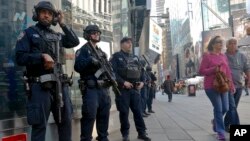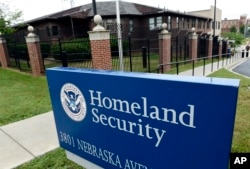U.S. and state officials are looking into a possible plot by the al-Qaida terror group to launch an attack on or before the U.S. presidential election.
New York City police said Friday that they were working with the FBI's Joint Terrorism Task Force and their own intelligence units to assess the threat's credibility.
"The information lacks specificity," Deputy Commissioner Stephen Davis cautioned, adding, "We take any intelligence reports regarding New York City seriously."
Speaking during a weekly segment on WNYC radio, New York City Mayor Bill de Blasio said the threat was not new.
"I've been aware of this for several days," de Blasio said. "We are still very much assessing the credibility. It is not at all clear how credible this is."
Three states
Word of the threat emerged four days before Americans go to the polls, with intelligence officials warning the states of New York, Virginia and Texas might be targeted.
A U.S. Department of Homeland Security official said the agency was aware of the possible threat but refused to comment on any specifics.
"As we have long said, in this environment, homegrown violent extremists could strike with little or no notice," the official told VOA. "Our concerns that violent extremists could be inspired to conduct attacks inside the U.S. have not diminished."
In its own statement, the FBI said the U.S. counterterrorism and law enforcement communities "remain vigilant and well-postured to defend against attacks."
Already, New York City residents were being told to expect a heavy police presence for the next several days because of several high-profile events, including the New York City Marathon on Sunday and Tuesday's election.
"We're already planning an extraordinary police presence for Tuesday because for the first time in memory there will be two presidential campaigns having their victory celebrations in New York City," de Blasio told WNYC.
Virginians prepare
While New York City had been warned in advance, some police departments in Virginia said they had not been informed of any imminent threats, though they said their intelligence units had been in constant contact with the FBI and other federal agencies.
"If they do receive anything they think is credible, they'll of course follow up on it," said Officer Tawny Wright, a spokeswoman with the Fairfax County, Virginia, police.
Wright said her department was also preparing for Election Day as a matter of course. "We'll have officers in the area, and we have a plan in place," she said.
Although officials emphasized the vague nature of the threat, they admitted that trying to strike around an event like a presidential election fit well with al-Qaida's known tendencies.
And counterterror officials have warned for years that despite the Islamic State terror group's quick rise to prominence on the global stage, al-Qaida remains the most significant threat to the U.S. homeland.
"We still view al-Qaida and the various al-Qaida affiliates and nodes as a principal counterterrorism priority," National Counterterrorism Center Director Nichols Rasmussen told lawmakers in September.
No surprise
Analysts also say it's not surprising that the possible threat emanates from al-Qaida, not IS.
According to a soon-to-be released study by the Program on Extremism at The George Washington University, of the 178 individuals arrested in the U.S. on jihadist terrorism-related charges from March 2011 to July 2016, 97 were either unaffiliated with any group or had ties to al-Qaida or an al-Qaida affiliate.
"Islamic State is no doubt the most capable and the most popular right now, but other groups — al-Qaida and its franchises, for example — retain a level of interest from American jihadists," said research director Alexander Meleagrou-Hitchens.
It is also likely not a coincidence that New York and Virginia are listed as potential attack targets.
"New York remains one of the biggest targets for any jihadist terrorist group because of the global eyes that are on that city, and Virginia has a sort of a disproportionate amount of terrorist-related activity," Meleagrou-Hitchens said. "It tends to be one of the places where we see a lot of American jihadists radicalizing."
Pentagon worried
Whether al-Qaida is trying to link with any jihadists living in the U.S., or whether it is trying to sneak in its own operatives, American military officials have grown increasingly concerned about a potential resurgence.
The Pentagon this past week spoke openly about quickening the pace of strikes against key al-Qaida figures.
"This remains a transregional organization," Pentagon spokesman Captain Jeff Davis told reporters. "They remain capable of moving around."
On October 17, a U.S. drone strike in Syria killed Haydar Kirkan, described as a senior al-Qaida facilitator and external operations planner who had ties to former al-Qaida leader Osama bin Laden.
Four days later, a strike in Yemen killed Abu Hadi al Bayhani, a leader of al-Qaida in Arabian Peninsula.
Then on October 23, U.S. strikes in Afghanistan targeted Faruq al-Qatani and Bilal al-Utabi, also described as senior leaders.
Pentagon spokesman Peter Cook called al-Qatani a senior planner for attacks against the United States with "a long history of directing deadly attacks against U.S. forces and our coalition allies."
The possible Election Day threat was first reported by CBS News.






